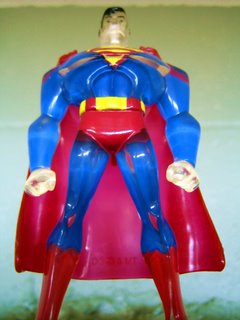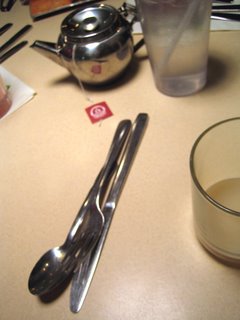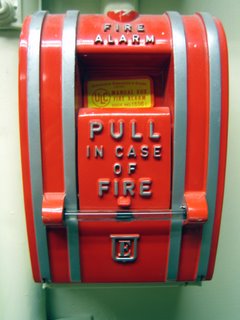 The week-end was mostly garbage, mostly because of about fourteen hours where the side of my head felt like a large damp fireball. Does that make sense? Hurtingness and swellingness and not-nice-ness. All gone, now, though! Just in time for the grind to begin again, which is not school, but work. This morning sees me up at five-thirty because I'm working in St.Albert at seven. Then jet off, or move slowly by bus, to classes down at Uni, then work tonight at the WEM until ten, then back home by eleven. Garbageness. Tuesday, I'll have some music business about The Ark, nothing more today. Plus, I'm going to do some stuff about Edgar Rice Burroughs, who I love despite all of his many and terrible and grotesque flaws as a writer. Plus, what is the deal about this former local Matthew Skelton character who went astray in England and now has a million-dollar book-deal? Endymion Springs? This sounds like a Dan Simmons novel, for godsake, not a first-effort children's thickie worthy of mucho monetary reward. You can hear the publishers breathing heavily in the background, hoping for another Rowling, which isn't going to happen, it just isn't. But it makes me hope that Skelton's book will be able to stand on its own two feet. It's going to have a lot of competition from the Pullmans and Rowlings before it.
The week-end was mostly garbage, mostly because of about fourteen hours where the side of my head felt like a large damp fireball. Does that make sense? Hurtingness and swellingness and not-nice-ness. All gone, now, though! Just in time for the grind to begin again, which is not school, but work. This morning sees me up at five-thirty because I'm working in St.Albert at seven. Then jet off, or move slowly by bus, to classes down at Uni, then work tonight at the WEM until ten, then back home by eleven. Garbageness. Tuesday, I'll have some music business about The Ark, nothing more today. Plus, I'm going to do some stuff about Edgar Rice Burroughs, who I love despite all of his many and terrible and grotesque flaws as a writer. Plus, what is the deal about this former local Matthew Skelton character who went astray in England and now has a million-dollar book-deal? Endymion Springs? This sounds like a Dan Simmons novel, for godsake, not a first-effort children's thickie worthy of mucho monetary reward. You can hear the publishers breathing heavily in the background, hoping for another Rowling, which isn't going to happen, it just isn't. But it makes me hope that Skelton's book will be able to stand on its own two feet. It's going to have a lot of competition from the Pullmans and Rowlings before it.
At The Earth's Core + Edgar Rice Burroughs I always liked Professor Liedenbrock. I liked the everyday romance of the man. And I wished (I still wish) that I could live at 19 Königstrasse, one of the oldest streets in the city of Hamburg, and that cowbirds would squawk in the highly-trimmed trees as, one by one, up the long sidewalk, would come venerable Henri Becquerel, Captain John Franklin, the Irishman Edward Sabine, Andre Dumas the chemist, and many other holy and reverend physicists and explorers. Axel and I would play with pretty Grauben to see which one of us she liked the best, and the Professor would walk from room to room with mathematical steps, his hands clenched comfortably at his sides. And our journey to the center of the earth would be a story we would never really talk about, simply because there were so many more interesting stories to remember than the mere vague images of the end of that long trip through the caves and fissures buried under Iceland and the volcano Stromboli.
I always liked Jules Verne's A Journey To The Center Of The Earth. But I always felt betrayed by the final chapters of that novel, when the heroes navigate their way over the nebulous lava, see some strange plant-life, some colorless images of mastodons, perhaps a cave of bones and one glimpse, at a far distance, of a buffalo-headed man. And then back to Germany. That is no way to end thirty-plus chapters of atmosphere and exertion, Jules. That is no way to serve your readers.
Edgar Rice Burroughs to the rescue, then. At The Earth's Core is not concerned with evoking atmosphere, so much as creating spectacle. Pictures, not emotions, are the centre of the story. Spectacle is created by contrast, of course, so the book starts off with a deep bow to realism. Although the title page of Burroughs' work is stamped with his name, page one of the story begins with a complete disavowal of the whole thing. Burroughs did not write this little novel, but claims to have received it from someone else, a man who wrote this book not as a novel but as a record of exploration and incident much like Richard Burton or Edward Shackleton would have written if they had taken such a journey. Everything in the novel, then, that rationality smiles at, becomes rationally defensible. "These things couldn't possibly happen." But Burroughs is not saying they did, he's just passing on what someone else told him, there's no one to argue against here. The man to pick a bone with is not present, he is, well—the title says it all, doesn't it? So the story begins with this man, David Innes, who has a lot of money and a yen to simply do something (Umberto Eco, elsewhere, writes "I wrote a novel because I had a yen to do it. I believe this is sufficient reason . . . ."). Innes is healthy, young, a typical representative of Empire, something along the lines of Sir Henry Curtis or Richard Hannay and he's got the usual Watson along in the form of Abner Perry, a man who studies paleontology for relaxation and explains it for the reader's education. Perry has a theory about the earth's core, Innes has the money to build a machine to test the theory, and, bingo, Burroughs has a novel. Getting to the center of the earth takes all of one chapter. What happens at the center of the earth has little to do with the just-a-glimpse-before-the-story-collapses realism of Jules Verne. Verne is trying to write a realistic version of a more-or-less logical series of events. To describe the creatures of an interior earth, their habits and borders, would be to wander very far away from realism, which necessarily bases itself on what we perceive to be real and likely, not on what would be real under unreasonable circumstances. That is why Verne's journey through the earth is most of the novel and mostly rock. Burroughs gives a nod to the real and the likely by having Abner Perry wash it all away with pseudo-science about evolution. Leidenbrock, like Perry, has a theory. The aim of Verne's novel is to demonstrate the validity of that theory. Perry also has a theory. The aim of the novel is not so much to prove or disprove the theory (the theory is taken for truth in the introduction to the novel) as to demonstrate what life would be like if the theory was true, or, rather, to have fun with the possibilities under the new rules. A Journey To The Center Of The Earth closes with nearly everyone residing contentedly in Germany. At The Earth's Core has David Innes, in danger of death, doing his utmost to return to the center of the earth. The first novel is a treatise, the second a vision. Verne's work is much the better written, much more realistic, much more well-known. Burrough's work, I say again, has the vision. The titles of these books say it all, don't they? One is the cliché concern for the process over the result, the journey, and not the end of the journey: the other is concerned with what is happening in the present instant. There is no journey, there is no process, there is only Right Now. This spectacle is Burroughs' flaw as a writer, of course, lending itself to cardboard characters and paper-thin plots, but also lending itself very easily to a constant parade of action and marvel. Burroughs gives us the circus, the spectacle, he does not bother to show the moving parts behind tha machine, the shabby lives behind the carnival. He is selling a show, not defending a premise; creating a vision, not dissecting it. He is selling tickets to one of the gaudiest cheerful shows in the golden era of early pulp fiction, he is a ring-master, and not a scholar. And thank God.
"This Piece Of Poetry Is Meant To Do Harm" + The Ark Let's throw around some sounds-like ideas, here. Okay, The Styx, I hear it, certain turns of the voice. Anything folk-rock from the seventies, sure, I'm listening. Yeah, and Shakespeare. Especially this song, and not just because of lyrics like "Let the cool winds roughly shake / Out all darling buds of fake", and not just because of the Elizabethan-style wrenched metre of "COM-pare" in "So with what shall I compare thee? / Summer's clay or winter's sleet?". I'm talking more about the idea, knocked out in the title, that words are engines, construcions, concrete machinery, really, fashioned to certain solid ends. That these ends are within the reasonable reach of these words. Do you know what I mean? Not spells or incantations, although that wild aspect of words is certainly there, but something more along the idea that words are the equivalent of actions. Oh, and how they can be, too.
As far as the sound of this tune goes, which is what I started discussing (but I sidetracked myself), very poppy, very folky, but a solid combination of the two, warm country harmony rock—NOT alt. You know this song is going to be good the instant you hear the second guitar in the second verse. And you can hear the payoff at the end of the fourth verse when the break comes, it's wonderful.










